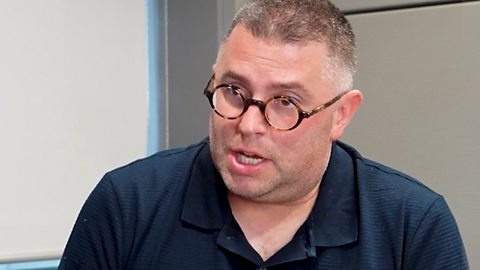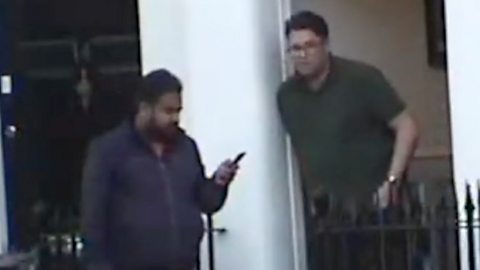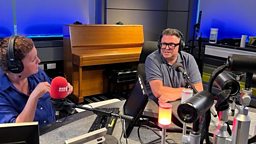'I was a scammer, now I fight fraud'

For more than 20 years, Alex Wood was a “hyper-prolific fraudster”, at his peak, calling up his victims pretending to be from the bank in order to steal vast sums of money.
Alex was undeterred even by several prison sentences, until one eye-opening, devastating day in court led him to turn his life around.
Now he helps the police, the banks and the public to better protect against criminals, as he once was, by sharing his knowledge with ��ѿ��ý Radio 4's Scam Secrets.
From child prodigy - to career criminal

Alex's life started out very differently.
“I stole vast sums of money and ruined businesses"
A child prodigy, Alex toured the world as a teenage concert violinist and became a regular performer at Buckingham Palace and Windsor Castle.
But at the age of 24, he says an injury to his wrist ended his career prematurely, and he found himself drawn into a life of serious fraud.
“I committed some very, very serious financial crimes,” Alex states. “I stole vast sums of money and ruined businesses.”
One of his most high-profile frauds was pretending to be the 13th Duke of Marlborough, and "staying in central London 5-star hotels for nothing", he says, sending the invoices back to Blenheim Palace.
Alex racked up bills of more than £10,000 whilst posing as the Duke, and was jailed for three and a half years in 2015.
A criminal education
Alex says during his numerous stints in prison, far from acting as a deterrent, he learned from other inmates how to commit more sophisticated frauds.
"When I was in prison, I learned how to become a better criminal"
"When I was in prison, I learned how to become a better criminal", he says.
One such criminal technique he learned was how to commit authorised push payment fraud (APP), when criminals manipulate their victims into sending them money by pretending to be the bank.
When Alex and his co-conspirator committed their first APP fraud, just a day after Alex was released from his second prison term, together they stole £100,000 from a law firm.
“We panicked,” Alex admits. It had felt too easy. “We ran to the nearest big bin we could find, smashed up the laptop, got rid of the phones and were literally terrified.”
But nothing happened, so they carried on.
“I convinced them, I engineered them, manipulated them to send millions of pounds from their accounts by logging in and creating payments," he said.
“We could make a million pounds in 40 minutes using an iPhone"

In episode one of Scam Secrets, Alex says he would make a number of calls to his victims before committing the APP fraud.
"We would sometimes try to establish which bank they were with... [we would] phone somebody one week and say, 'Hello, I'm phoning, from say Barclays Bank,' for example. And they might say well say, 'Well, why are you calling me? I'm with NatWest.'
"And so, okay, great, make a little note of that. Two weeks later, phone as NatWest. And say, 'Have you had a suspicious call a couple of weeks back?' And they're like, 'Yes, that's very strange. That was somebody saying they're from Barclays.'
"And then that is the lead-in to saying, 'Well, okay, we think maybe somebody has been trying to attack your data'".
Alex says he would then act as the bank, heartlessly claiming to be protecting his victim from scammers, when in reality he was the real criminal.
Listen to episode 1 of Scam Secrets, 'I'm Calling From Your Bank', here.

I committed 'every type of scam'... now I fight fraud
Alex Wood used to be a scammer - he now helps protect society from people like him.
One of the other methods he claims he used at the time was number spoofing.
"We thought that we had beaten the system and effectively come up with the perfect crime"
When he contacted a victim by phone, he says, the number they saw on their screen would look like their high street bank was on the other end of the line.
“The thrill, I think, was in feeling that we were bigger than the police, bigger than the banks,” he admits. “We were better than them.”
“We had a modus operandi that was so beautifully easy.”
Unlike industrial-scale drug dealing, Alex says, there was no upfront investment required; no risk of being shot by a rival.
“We could make a million pounds in 40 minutes using an iPhone and no one's going to kill us… We thought that we had beaten the system and effectively come up with the perfect crime.”
“It was nine months before we got caught.”
A lavish lifestyle - with stolen cash

Alex claims he spent "suitcases full of cash" he had stolen, on a fast life - hiring "private jets, helicopters, Bentleys, Rolls-Royces."
"[We] would sit down and steal a million pounds and go and blow the lot"
He says he would buy expensive Swiss watches and claims the rent on his Central London house was £6,000 a month.
“I used to go out on a Friday and Saturday night with my friends to a restaurant in Central London and spend about £20,000 without a blink of an eye.”
Saving money was not on his agenda.
“Myself and my co-conspirator would sit down and steal a million pounds and go and blow the lot because we were confident the next day, we could do exactly the same.”
It was transient pleasure, he admits: “I wasn't building up anything meaningful.”
And yet, he had no trouble sleeping at night.
“I slept in a very, big comfortable bed, and usually full of alcohol and cocaine, and I was absolutely fine with it.”
“I never thought about my victims,” he confesses.
“As soon as I terminated the phone call, I just focused on what we were going to spend the money on.”
Stopped in his tracks

Alex says he was "careful" to not get caught - checking his home constantly and getting his chauffeur to take alternative routes to be sure they were not being followed.
"The National Crime Agency took my front door off and arrested me.”
One of his most extreme methods to avoid capture was to hire a helicopter to fly from London to Coventry, where he and his co-conspirator would commit crimes from a designated "safe house".
Because the train to Coventry took over two hours, he thought the police would not suspect him.
“It would cost me £6,000 each way,” Alex says.
As Alex and his criminal accomplice became more successful, they also became more arrogant - and as a result, he says their security measures became more and more lax.
“We’d become so confident that nobody was following us, we didn’t bother with the safe house anymore.”
But they were wrong.

Watch: The moment Alex Wood was arrested
Met Police footage shows the moment Alex was arrested by the National Crime Agency.
“I was in my town house in Camden and my co-defendant had just left, and I think we'd stolen a million pounds that day,” Alex recounts.
“Five minutes later the National Crime Agency took my front door off and arrested me.”
Alex’s crimes were so serious, he was denied bail and held in the terrorist unit at Belmarsh Prison to foil any attempts to escape.
The cash the police found in Alex’s home was enough to charge him with money laundering.
"Over the course of six months, the police would come every couple of weeks with more charges, and eventually they got very, very serious,” Alex recalls.
A month before the six-month custody time limit expired, the pair were charged with a single £1.2 million fraud offence.
“That put us in the top category for seriousness and harm.”
In court, the true consequences of his actions hit home

On July 18th, 2018, Alexander Wood stood in the dock at Blackfriars Crown Court.
"I realised in that minute, in that instant, that fraud is far from victimless."
He had pleaded guilty and says he “bounced into court” knowing what the punishment would be.
In his mind, despite the seriousness of his situation to most people, a handful of years in an open prison was, he says, "no rent to pay, no bills, so it’s almost like a holiday camp”.
The victims of his crimes were far from his mind.
“I knew that there would be an initial shock once the victim logged into their account and saw that the money had gone.
"I knew that the victim would then have a load of stress and have to phone the bank and explain what had happened and that would be very, very irritating… But ultimately, I believed that they'd be refunded by the banks.”
“I didn’t think really that the victims would be carrying the burden.”
But that was all about to change, profoundly.
The prosecutor read out a statement from the victim, explaining the unimaginable impact Alex’s crime had had on them personally and on their company.
Months of litigation with their bank had caused immense financial loss, turmoil and sickness amongst the directors.
They had had to let 40 members of staff go.
“One person had re-mortgaged their house to fund the company and was risking losing everything because of what I'd done,” he recounts.
“The person who had answered the phone that day when I'd phoned up, described how she no longer trusts anybody. When the phone rings, she panics.”
“I realised in that minute, in that instant, that fraud is far from victimless. Fraudsters always describe fraud as being a victimless crime because you're not leaving somebody bleeding to death in the street,” he says.
“But actually, the impact of this offence, I realised, was as bad or worse.”
At that moment, Alex says he turned his back on his two-decades in crime.
"Monumental shame"
“Personally, the impact has been profound,” says Alex. “I don't think I slept for weeks after that.”
"The impact [was] profound... I don't think I slept for weeks"
It had a devastating effect on his family too.
“My dad was in court for the sentencing hearing and a couple of weeks later had a heart attack and I absolutely blame myself for that.”
“My mum has only recently just started to trust me again,” he states. “She was absolutely ashamed of me.”
He says he still feels “monumental shame” himself.
He was ordered to pay back hundreds of thousands of pounds by a court order. That order has been fully satisfied but will stay over him for the rest of his life.
“I used to beat myself up when I was in prison and for about a year or two afterwards… and then my probation officer actually said to me, there's no point.”
Alex says he had been sitting in probation meetings crying; he had to move on.
"I do everything I can now to help society"

“That's why I now talk about it and try to help people understand it,” he states. “I do everything I can now to help society.”
“I do everything I can now to help society"
He says he uses his intimate, intricate knowledge of fraud techniques to work with financial institutions, police forces and Regional Organised Crime Units to examine the “constant evolution of threat”.
For example, how “the bad guys” might use the latest technologies like AI, deepfakes or quantum computing, and the most sophisticated social engineering techniques to commit their crimes.
“I am part of the Scam Secrets team so that I can help show the public how criminals are trying to steal your money.”
Alex joins ��ѿ��ý fraud reporter Shari Vahl and forensic linguist Dr Elisabeth Carter on the show, dissecting how complex frauds work piece-by-piece.
In the series, they cover everything from devastating dating frauds to a bizarre cardigan scam - with shocking victim testimonies and secret recordings of the criminals themselves.
Together, they will arm you with the inside knowledge you need to beat the fraudsters.
Episodes of Scam Secrets will be released every Thursday on ��ѿ��ý Sounds, and you can listen to the series so far here. You can also hear the programme weekly on Radio 4, at 12.04pm.

-
![]()
Listen to the 'I'm Calling from Your Bank' episode of Scam Secrets
Your bank is on the phone. The man knows all your details. He says there's a problem on your account. Would you know what to do?

